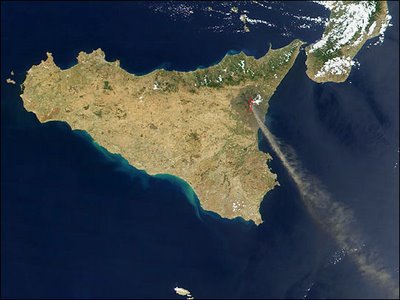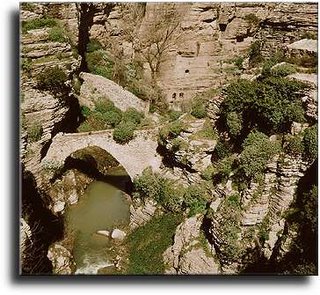The Great White Second Coming of
 What if it were to be shown that the Mafia had its beginnings in Muslim culture and traditions that came with the Saracen invasion of Sicily in AD 832, an occupation that lasted well into the tenth century?
What if it were to be shown that the Mafia had its beginnings in Muslim culture and traditions that came with the Saracen invasion of Sicily in AD 832, an occupation that lasted well into the tenth century?One fellow, in commenting upon this pet thesis of mine had this to say, "Well, OK, but . . . anyway, the invaders brought huge benefits to the island and religious tolerance that didn't exist under Christianity."
To which I reply . . .
That is the ever so popular postmodern mythology of multiculturalist historical revisionism, which the body of this present research promises to blow so far out of the water, that as you see the geysering spout of it rise to the sky, you are apt to think you are out at sea in a boat watching the Great White Second Coming of Moby Dick.

As this research continues into the historical mystery of the Sicilian Mafia/Saracen Muslim connection, one would trace the linguistic sources for the word, "Mafia", which brings some fascinating material into view as from the following . . .
Here a number of possible etymological guesses are given, as e.g. that ". . . the word derives from the Arabic, 'either from mahias, meaning a bold man or a braggart, or from Ma afir, the name of the Saracen tribe that ruled Palermo.
 A third theory of Arab origin relates mafia to maha, a quarry or a cave in a rock. The mafie, the tuff caves in the Marsala region, served the persecuted Saracens as hiding places and later provided hide-outs for other fugitives' (2, Lestingi 1884). Hess states that Giuseppe Loschiavo (not to be confused with Giovanni Schiavo) writes that before Garibaldi's landing, 'the rebellious Sicilians had hidden out in the mafie near Marsala and had therefore subsequently, during their successful advance on Palermo, been called mafiosi, the people from the mafie' (2, Loschiavo 1964)."
A third theory of Arab origin relates mafia to maha, a quarry or a cave in a rock. The mafie, the tuff caves in the Marsala region, served the persecuted Saracens as hiding places and later provided hide-outs for other fugitives' (2, Lestingi 1884). Hess states that Giuseppe Loschiavo (not to be confused with Giovanni Schiavo) writes that before Garibaldi's landing, 'the rebellious Sicilians had hidden out in the mafie near Marsala and had therefore subsequently, during their successful advance on Palermo, been called mafiosi, the people from the mafie' (2, Loschiavo 1964)."But to have found such direct and positive support for the theory so early on just seems too easy, so I've been moved to inquire into the possibility of further corroborating documentation. You can imagine my chagrin to find that beyond the above cited, sort of Sicilian "Office of Tourism" site, there was really very little else to be found upon a search via the two keywords, "Mafie" and "Sicily", outside of what turns out to be the webpage of an AOL listserv containing the subject header, to wit: "UFO -- Mafia Connection".
Just what I needed to shore up the credibility of my thesis, I thought, but then, "Oh well, if wishes were sources . . ." So I searched the page for "Mafie", and here's what turned up . . .
"It is almost certain that, given the history of the island of Sicily, the term 'mafia' has Arabic roots. Some researchers have pointed out that the Arabic word 'Mu' means 'safety' and that the verb 'afah' means 'to protect': 'mu afah' would therefore refer to the Mafia as a clan offering protection to its members.
 The most likely source of the term 'Mafia' probably comes from the Arab word 'mafie' (actually 'maha' or 'mahias hajar' in Arabic), rock caves in the area of Trapani and Marsala, which were used by Saracens, later by bandits, and finally by secret groups and bands of anti-Bourbon volunteers. When Garibaldi and his men invaded Sicily, he and his thousand men lived in the caves and were known as the 'squadri della mahia' or the 'squadri della mafia'. The local Sicilian dialect transformed the sound 'mahias' into 'Mafia'." UFO-Mafia listserv
The most likely source of the term 'Mafia' probably comes from the Arab word 'mafie' (actually 'maha' or 'mahias hajar' in Arabic), rock caves in the area of Trapani and Marsala, which were used by Saracens, later by bandits, and finally by secret groups and bands of anti-Bourbon volunteers. When Garibaldi and his men invaded Sicily, he and his thousand men lived in the caves and were known as the 'squadri della mahia' or the 'squadri della mafia'. The local Sicilian dialect transformed the sound 'mahias' into 'Mafia'." UFO-Mafia listservWell! I could hardly have lucked into a more directly corroborative source, as the material is in many points nearly identical of content to the first, from that sort of Junior Mafia Chamber of Sicilian Commerce site--but *who* now was the source of this information? Was it some alien UFO jockey of a sexy Mafia gun-moll from Venus?
Quite. Or, almost. It is Gaia Servadio, who is, in a sense, all that, and more. She is an Italian free-lance journalist, erotic novelist, and feminist biographer, author of e.g., *The Real Traviata: The Life of Giuseppina Strepponi, Wife of Giuseppe Verdi* and rather an impressive list of other biographies; the Rossini got a glowing review from PW; there's another on Luchino Visconti, and something under title of "Renaissance Women", but not least, there are at last, three books on the subject of the Mafia. Want to see a picture of her?
Of course you do!
And be sure to click that "Zoom Image" button.
But if that's not enough for you, try this
 Or if any can find fault with that or even with this (to our left), then it's just a child being cranky and perhaps a change of diapers is in order. So we move on with another click to Amazon for a closer look into the imagination of this Amazon:
Or if any can find fault with that or even with this (to our left), then it's just a child being cranky and perhaps a change of diapers is in order. So we move on with another click to Amazon for a closer look into the imagination of this Amazon:"She only knows him as R. But wealthy businesswoman Polissena Lockhart soon realises that the beautiful young man captive before her is ripe for a new kind of adventure. Even his shyness gives her a sense of power. From that moment on she wants to overcome him, to draw him into her game--and to dominate him. She is going to make him suffer. Because that is the way she likes it.
Millions shared the secret fantasies of "The story of O"--the erotic tale of a woman subjugated by her lover. "The Story of R" finally redresses the balance of power between the sexes..."
I now find myself compelled to say, in abject submission of conclusion, that the credentials of the second corroborating source for my pet thesis could not be more firmly established. And I can hardly wait to start reading her books--much as I am still deeply and most satisfyingly immersed, at present in the works of my very most favorite psychoanalyst, Anaïs Nin, even so, I aim to get me a copy of that Gaia Servadio's "Story of R"--and I don't maybe.
